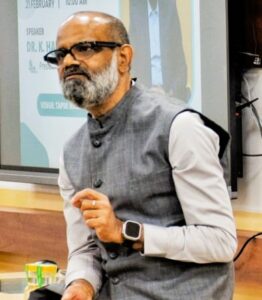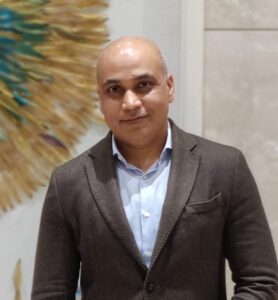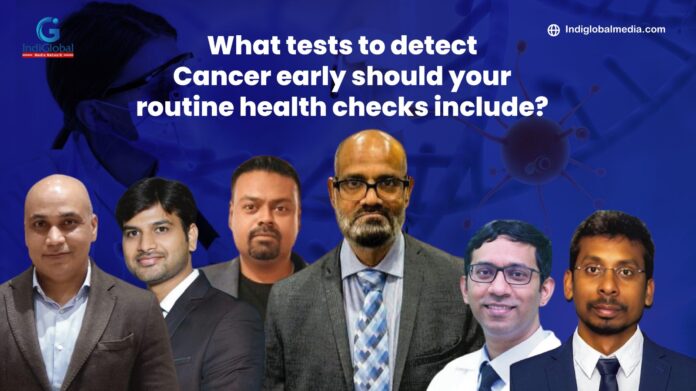By Sudheer Goutham
The ever-increasing burden of Cancer disease worldwide, particularly in India, is slowly affecting every home, hitting the socio-economic conditions of a family while causing an emotional drain for the patient and their relatives.
The only way to combat and conquer this dreadful disease is to equip oneself with mindful education and rely on preventive measures. Many Cancer diseases are said to be cured and treated effectively if detected early.
The most crucial question is whether our periodic health checkups include tests that can detect cancer diseases early. IndiGlobal Media Network reaches out to the best specialists and experts in Cancer care across the country for answers to all the possible questions a family may have about taking preventive measures against cancer.
Is there a comprehensive test that can detect all types of cancers?
No. Most detection methods available are Cancer-specific.
Family History and Habits

Pioneer of Indian Emergency Healthcare and a Cancer conqueror himself, Dr K Hari Prasad, Group Chairman & Non-executive Director of Quality Care India Ltd, observes, “It is impossible to do a comprehensive preventive health check for all types of cancer. However, based on family history, age, and habits like smoking, specific tests like Pap smear, mammography, and ultrasound abdomen can be used for screening.
Specific Markers
“More specific markers are now available but are expensive and must be used prudently. There are packaged tests for some types of cancers, but they do not cover all of them. Having said this, one should never neglect family history or any symptoms and must take a doctor’s advice and get the requisite tests done. It is always better to be on the safer side, particularly when we talk about cancer,” said Dr Hari.
Addictions

Dr Prudvi Raj, Consultant Surgical Oncologist and advanced Laparoscopic and robotic Surgeon notes that “Routine health checkups taking the family as a unit is still not ripe in India, although the diagnostic firms are sprouting like mushrooms with their discounting packages backed by no evidence.
However, for the most common cancers in our country, we can do a periodic Oral examination for anyone with addictions, sharp teeth, increased spiciness, acidity problems, clinical breast examination with Mammography +USG in suspicious cases above 40 years colonoscopy above 40 or early if there is a family history Pap smear.
Age Factor, Gender and Lifestyle

Mr. Saurabh Gupta, Regional COO & In-charge New Hospital Commissioning, KIMS Group of Hospitals, underlines that “Late detection of common cancers is primarily due to not having cancer screening infra or part of the Govt policy. Cancer in India is still not a notifiable disease. However, early detection of common cancers like breast, prostate and head & neck is quite possible with screening tests for cancer. It helps identify high-risk populations (people who have a family history), especially in Breast cancer.
Any female above 40 years, once in 18 months, should have mammography and markers. Males above 50 should have a Prostate Specific Antigen (PSA) every year, which can easily be part of the routine health checkup. Along with that, lifestyle-induced high risks, like smoking, tobacco chewing, high alcohol consumption, and obesity above 40 years, can occur once in 18 months chest X-ray. And regular dental checkups. Self-breast examination of 6 steps should be mandatory for females above 25 years.
Tests that need to be included in routine health checkups

Dr Naresh Gundu, Consultant Medical Oncologist & Hemato-oncologist, CION Cancer Clinics – Aster Prime Hospital, suggests that families consider including several routine screening tests in their health checkups. These include mammograms every two years for women over 40, Pap smear and HPV testing every five years for women over 30, serum PSA testing for men over 65, colonoscopy and stool occult blood tests for individuals over 50, and low-dose CT scans for the chest for individuals aged 55-75 with a history of heavy smoking (20 pack years – If you have smoked a pack a day for the last 20 years, or two packs a day for the previous ten years, you have 20 pack-years).

Dr Ajesh Raj Saxena, Consultant Surgical Oncologist and minimal Access Surgeon at Apollo Hospital, Hyderabad, recommends the following tests and screenings, along with routine health checkups by a medical specialist.
- Pap Smear and HPV Testing: recommended for cervix cancer screening in women. Recommended every three years from 21-29 years and 30-65 years three yearly Pap smear or five yearly co-testing along with HPV DNA testing
- Mammography: For breast cancer in women, starting 40-45 years, earlier if there is a family history.
- Colonoscopy: For colorectal cancer, usually starting at age 45 years.
- Prostate-Specific Antigen (PSA) Test: For prostate cancer in men, typically starting at age 50 or earlier if there is a family history.
- Low-Dose CT scan: For lung cancer in heavy smokers, usually starting at age 55.
- Skin Examination: Regular checks by a dermatologist for skin cancers.
- Blood Tests: Including complete blood count (CBC).
- Oral Examination: Regular dental checkups for oral cancers.
Is it true that certain cancers are detected only in later stages despite routine checkups and have limited treatment options?
Dr Prudvi Raj, Consultant Surgical Oncologist and advanced Laparoscopic and robotic Surgeon says, “Yes, most cancers do not cause any symptoms in the early stages except a few varieties, like uterine endometrial cancers, which will give an early symptom. To date, there are no simple, accurate health checkups to pick up most cancers early for meaningful outcomes in treatment.”

Mr. Varun Sharma, AVP of Strategy & Business Growth, American Oncology Institute, notes that neuro, lung, bone, GI, and lung cancers are challenging and generally detected at advanced stages. However, there are many treatment options available. “Treatment option limitation was ten years back. And this is one of the fascinating areas for newer therapies, quips Mr Sharma.
Undertrial blood tests to detect more than 50 types of cancer.
A trial of a new blood test in Europe shows promising results in detecting mutations early (more than 50 types of cancer). Is it available in India?
The trail is called Galleri by a company called Grail. It is a blood test that identifies various signals of mutation changes. Recommend for only aged above 50 years. However, it is still in lab research and has yet to be approved by the FDA US; as of now, it is only for clinical use and not approved for mass screening. No, it is not available or approved in India. Various trials are being conducted in NHS England.
Input credits to ·
- Dr K Hari Prasad, Group Chairman & Non-executive Director, Quality Care India Ltd (Care Hospitals, KIDS HEALTH & Evercare)
- Saurabh Gupta, Regional COO & In-charge New Hospital Commissioning, KIMS Group of Hospitals
- Varun Sharma, AVP Strategy & Business Growth, American Oncology Institute
- Dr Ajesh Raj Saxena, Consultant Surgical Oncologist & Minimal Access Surgeon, Apollo Hospital, Hyderabad
- Dr Naresh Gundu, Consultant Medical Oncologist & Hemato-oncologist, CION Cancer Clinics – Aster Prime Hospital, Ameerpet, Hyderabad
- Dr. Prudvi Raj, Consultant Surgical Oncologist, Advanced Laparoscopic & Robotic Surgeon- MS, DNB, M.Ch (Surg. Oncology, Tata Memorial Centre, Mumbai)- Fellowship in Laparoscopic & Robotic Colorectal Oncology & Peritoneal Surface Malignancies, Ex Asst. Prof TMC, Mumbai





